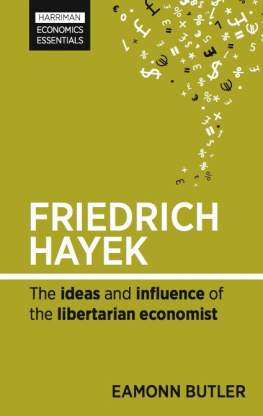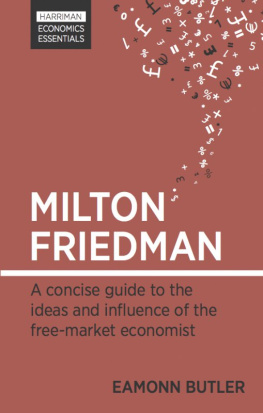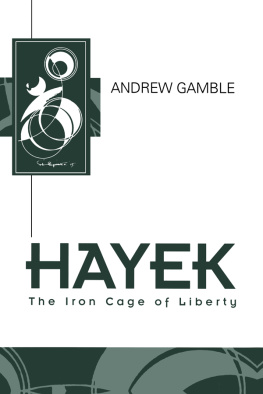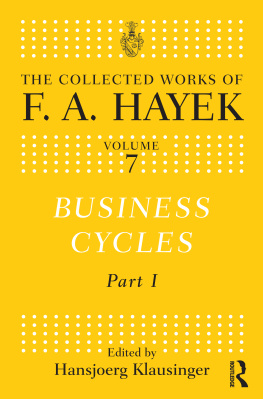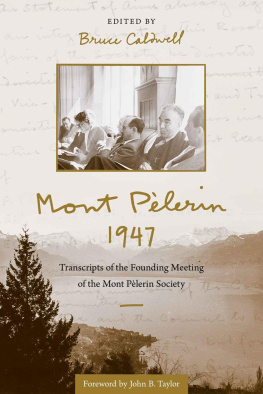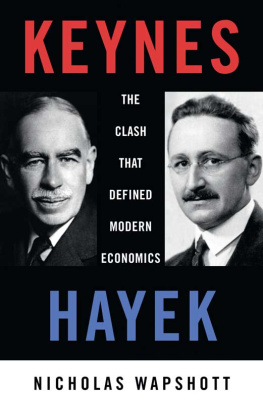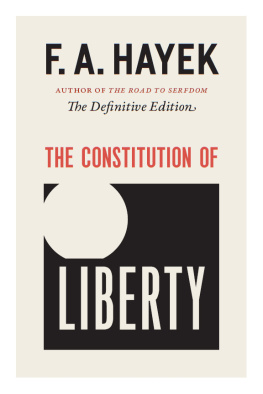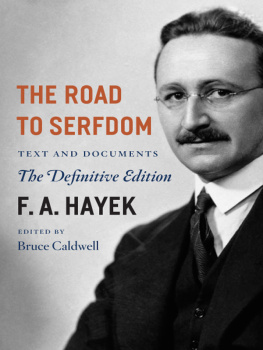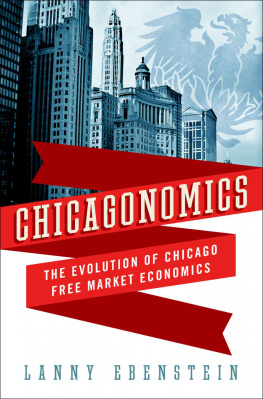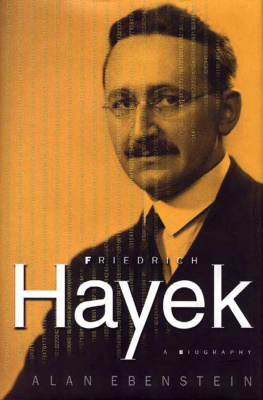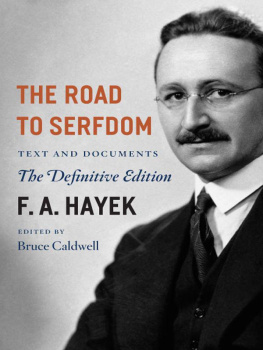Publishing details
HARRIMAN HOUSE LTD
3A Penns Road
Petersfield
Hampshire
GU32 2EW
GREAT BRITAIN
Tel: +44 (0)1730 233870
Fax: +44 (0)1730 233880
Email: enquiries@harriman-house.com
Website: www.harriman-house.com
First published in Great Britain in 2012
Copyright Harriman House Ltd
The right of Eamonn Butler to be identified as the Author has been asserted in accordance with the Copyright, Designs and Patents Act 1988.
ISBN: 978-0-85719-230-1
British Library Cataloguing in Publication Data
A CIP catalogue record for this book can be obtained from the British Library.
All rights reserved; no part of this publication may be reproduced, stored in a retrieval system, or transmitted in any form or by any means, electronic, mechanical, photocopying, recording, or otherwise without the prior written permission of the Publisher. This book may not be lent, resold, hired out or otherwise disposed of by way of trade in any form of binding or cover other than that in which it is published, without the prior written consent of the Publisher.
No responsibility for loss occasioned to any person or corporate body acting or refraining to act as a result of reading material in this book can be accepted by the Publisher, by the Author, or by the employer(s) of the Author.
About the Author
Dr Eamonn Butler is director of the Adam Smith Institute, a London-based think tank dealing in market economic policy. He has an MA in Economics and Psychology from the University of St Andrews, and a PhD in Philosophy from St Andrews.
Dr Butlers most recent books include The Best Book on the Market (Capstone, 2008), Milton Friedman (Harriman House, 2011), Adam Smith: A Primer (Institute of Economic Affairs, 2007) and Rotten State of Britain (Gibson Square, 2009).
Earlier books include Ludwig von Mises: Fountainhead Of The Modern Microeconomics Revolution (Gower, 1988) and Forty Centuries of Wage and Price Controls (co-authored with Robert L. Schuettinger, Green Hill Publishers, 1979). With Dr Madsen Pirie, he is also author of a number of popular books on IQ published by Pan. Since 1979 he has co-authored and edited a number of publications on economic and policy issues for the Adam Smith Institute.
Dr Butler writes regularly on economics for leading newspapers. In 2012 he received an Honorary D.Litt from Heriot-Watt University.
Introduction
What this book is about
This book is a straightforward guide to the ideas and influence of the Nobel economist Friedrich Hayek (18991992), regarded by many as the twentieth centurys most important thinker on social and economic freedom.
An Austrian who fled Nazi oppression, Hayeks insights into the workings of the free society and free economy, and his critique of socialism that stemmed from them, helped shatter the postwar faith in economic planning, and were a significant influence on world leaders such as Ronald Reagan and Margaret Thatcher. His ideas continue to influence economists, political scientists, politicians and students across the world today.
Hayek received the 1974 Nobel Prize in Economic Sciences, largely for his early work explaining the cause and effect of boombust cycles such as that of the 1920s and 1930s. He also made significant contributions in the fields of legal theory, psychology and information science. But Hayek remains best known for his work in political science, and for his books The Road to Serfdom (a caustic analysis of how socialism, if consistently followed, develops into totalitarianism) and The Constitution of Liberty (a major exposition of the foundations and principles of a free society).
Perhaps Hayeks key insight is the ability of market economies, through the price system, to process a vast amount of information including dispersed and personal information that no central planner could even know, let alone manage. This enabled him to explain the vibrancy of free, spontaneous social order, in contrast to the drab failure of planned societies.
Who this book is for
This book is written for people who want to learn more about the case for individual freedom and free-market capitalism and the deeply insightful case for liberalism put forward by one of its greatest exponents. (Throughout this book, liberalism is used in the European sense of support for individual freedom and limited government.)
The book explains Hayeks ideas on the nature of society and economics, and some of the criticisms that have been made of them. It aims to do so in plain language and without distortion. So there are no distracting academic-style footnotes or bibliography just an essential reading list of Hayeks main writings and important books about him.
The book should interest school and college students of economics, politics and social science, giving them a concise introduction to some radical ideas that are too frequently ignored by teachers and textbooks. Students will find plenty here with which to challenge those teachers!
Hayek is also relevant politically, as one of the leading gurus behind the rise of the New Right in the 1980s and 1990s. His ideas had a huge influence on a growing band of academics, intellectuals, think-tankers and politicians; and through them, these ideas influenced the radical pro-freedom and pro-capitalism agendas of Margaret Thatcher in Britain, Ronald Reagan in America, and other world leaders, including many from the former Soviet-bloc countries.
Why this book was written
At a conference in London in the early 1980s, the writings of F. A. Hayek were being discussed. The Alternative Bookshop had brought along a selection of Hayeks books; but I could see that many of the people browsing through them were intimidated by the academic density of some of these works and did not know where to start. Hayek was one of my main intellectual inspirations I knew him slightly and met him often at conferences and I was familiar with his ideas. So I resolved to write a short book on those ideas to help others discover and understand them.
That book was published in 1983, and was well received by many people who had never been introduced to Hayeks ideas, or even to the arguments for liberalism and capitalism. However, the book is now difficult to obtain; and increasingly, I have come to see its shortcomings. It is too long, too technical and too detailed for such a primer. It was also written when Hayek was still alive and working, which meant that I could not take a detached view of his output, nor fully assess his more enduring impact, nor take account of the many useful criticisms of his work that have been made subsequently.
This book, by contrast, is short and focused; the language is non-technical; it avoids academic trappings; it assesses the longer-term impact of Hayeks contribution and reviews the main arguments of his critics and defenders. So I hope it should provide an ideal primer on its subject.
How this book is structured
The book starts by showing Hayeks importance in the development of free-market and liberal ideas, and his impact on economic and social policy debates during his lifetime and today.
Chapter 2 outlines Hayeks groundbreaking ideas on the structure of society, and how societies do not have to be consciously planned in order to work efficiently. Chapter 3 explores the role of freedom and the law in maintaining the harmony of such societies.
Chapter 4 takes this idea into economics, sketching Hayeks view of markets as hugely effective at processing the dispersed and patchy information on which economic life is based far more so than any central planner. Chapter 5 goes on to describe Hayeks view on boom and bust cycles, and his analysis of how inept government policies distort the market process and stop it from working.

